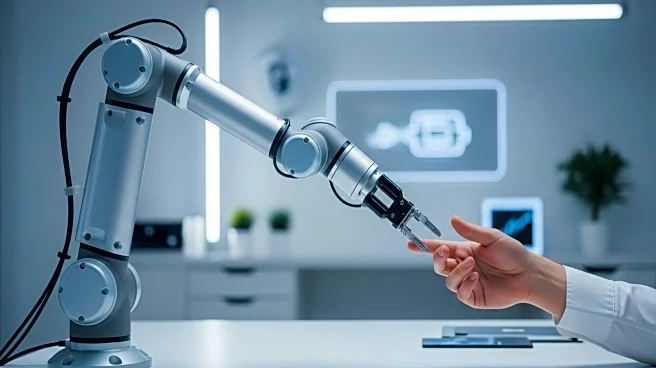What is the story about?
What's Happening?
A recent survey conducted by the Federal Reserve Bank of New York reveals that artificial intelligence (AI) is influencing hiring practices in the New York-Northern New Jersey area. Approximately 14% of service companies have reduced hiring or plan to do so due to AI, although layoffs remain minimal. The survey, which included about 300 executives, indicates that 40% of service companies are utilizing AI, a significant increase from 25% last year. The adoption of AI is also rising among manufacturers, with usage jumping from 16% to 26%. Despite the reduction in hiring, AI has created job opportunities for individuals skilled in its application, with some firms hiring new employees to work with the technology. The pullback in hiring is primarily affecting jobs requiring a college degree, with AI being used in various applications such as marketing, business analysis, and computer programming.
Why It's Important?
The integration of AI into business operations is reshaping the employment landscape, particularly for recent college graduates and entry-level workers. While AI is reducing the need for certain positions, it is simultaneously creating opportunities for those with expertise in AI technologies. This shift is contributing to a higher unemployment rate among recent college graduates, which has risen from 3.9% to 5.8% since 2022. The broader impact on the economy is relatively limited, as many businesses are opting to retrain existing employees rather than replace them. This trend underscores the importance of adapting workforce skills to align with technological advancements, highlighting the need for educational institutions and training programs to focus on AI-related competencies.
What's Next?
As AI continues to be integrated into business processes, companies are expected to further invest in retraining programs to equip their workforce with necessary skills. The survey suggests that nearly half of service and manufacturing firms plan to retrain workers in the next six months. This proactive approach may mitigate potential job losses and ensure that employees remain relevant in an evolving job market. Additionally, the demand for AI expertise is likely to increase, prompting educational institutions to expand their curricula to include AI-focused courses and certifications.
Beyond the Headlines
The ethical implications of AI in the workplace are becoming increasingly significant. As AI takes on more tasks traditionally performed by humans, questions arise regarding the balance between technological efficiency and human employment. Companies must navigate these challenges carefully to avoid exacerbating unemployment rates and ensure equitable access to retraining opportunities. Furthermore, the cultural shift towards AI-driven processes may influence workplace dynamics, requiring adjustments in management practices and employee engagement strategies.
















